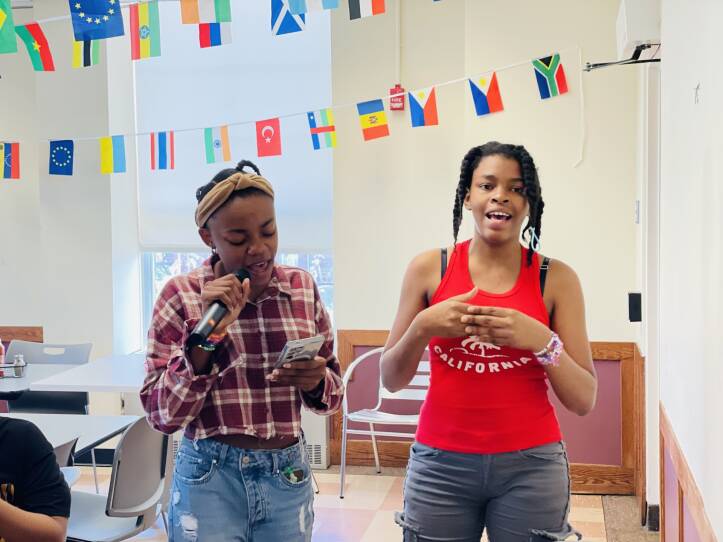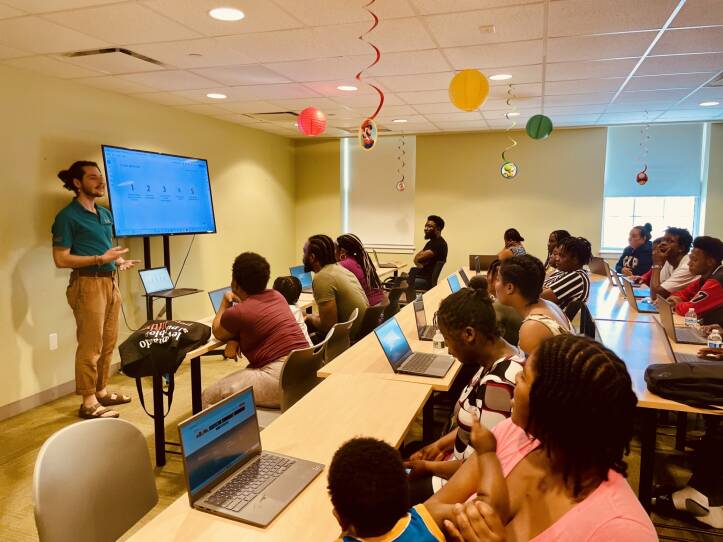The hallways inside the emergency overflow shelter in Chelsea are bustling with parents and children, many of whom stayed in day shelters and slept at Logan Airport before coming here.
This 200-bed shelter opened in April at the former Chelsea Soldiers’ Home, which closed earlier this year. It’s one of several overflow shelters the state set up to support the population of newly arrived migrants. Massachusetts’s emergency assistance shelter system last fall reached capacity of 7,500 families, creating an urgent need for options like the Chelsea overflow site to support those on the waitlist.
In the two months since opening the Chelsea shelter, advocates say “La Casita,” which it’s called informally, has become a successful model for housing migrant families and offering comprehensive services on site.
To get the shelter quickly up and running, the state is working with La Colaborativa, a Latino-focused social services organization based in Chelsea.
“I immediately said, ‘If you’re doing it, we want to run it,’” said Gladys Vega, La Colaborativa’s executive director.
“We have boots on the ground. We have done this work for decades, and we want to make sure that we take care of the recent arrivals as we are taking care of the community members at the new Survival Center,” Vega said, referring to the services offered at La Colaborativa’s own facility.

Officials say the shelter does not impact services for veterans, who moved in February into a new state-of-the-art facility nearby. Plans to demolish the old Soldiers’ Home buildings were put on hold when it was identified as a possible shelter site. With a 200-bed capacity, it’s now one of the state’s largest shelters.
“We essentially doubled the size of the system in a year,” said Allison Bovell-Ammon, director of policy for children and family services at the Executive Office of Health and Human Services.
Residents eligible for the State’s Emergency Assistance shelter program must have documentation to show they are in the United States lawfully. They are screened at the border and place of entry, and medically assessed for vaccinations. Once settled into the shelter, residents take classes in English, build resumes to find jobs, search for housing, and learn about the local culture.
“We want to make sure that people feel at home — that La Casita is the place, it’s not Logan Airport,” Vega said. “It’s a place where every family that has children or every individual deserves to have a roof over your head and be treated with dignity.”

The journey here
La Casita has 50 staff members, and dozens more volunteers who donate time, clothes, services and support. It took a tremendous amount of coordination to get the shelter up and running — and to keep it functioning.
“This was a hospital. It was filthy with medical equipment,” Vega said.
Vega and workers had 48 hours to clean it and fix it up to make it habitable for families with children. Renovations included new refrigerators, beds and bedding set up in dormitory-style rooms with blankets and laundry bags. The shelter provides services for very young children, while school-age children enroll in local schools.
“We also wanted to demonstrate to the governor and to all the city officials and the neighbors that this is a good thing,” Vega said, “And that we’re helping families. We’re helping human beings. Through no fault of their own. They landed here.”
And the migrants’ journey here was not easy. Many have trauma from the political turmoil in their home countries, like Haiti, Colombia and Venezuela.
One shelter resident, Carolina, who asked GBH News not to use her last name, arrived in the United States in October 2022. Through an interpreter, she explained she has three young children and a husband who was a police officer in Venezuela.
Carolina lived in Panama for two years before eventually crossing into Texas. She then came to Logan Airport, where she met up with her family, and where they lived for two months. Carolina said she left Venezuela because of the economic situation and the desire for her children to go to school.
“She wants her children to have an education, to learn the sacrifices as parents they have to make for their children to have a future in this country,” the interpreter said.

A migrant woman from Haiti, who didn’t want her name used, told GBH News through an interpreter that she lived in Chile for many years. She arrived at the Chelsea shelter in April and said adapting has been difficult.
“Leaving your home, leaving where you’re from, where all you know — it was extremely difficult to leave the comfort of home to go to another country,” she said. “Experiencing some of the things we experienced — the injustice — I never experienced racism until leaving our culture, and that was something we had to learn how to cope with.”
Moving on
Bovell-Ammon from the Executive Office of Health and Human Services said the state wants to help working-age adults find jobs and housing. According to the Healey administration, the state has spent $674 million in fiscal year 2024 to provide shelter and related services to families in the Emergency Assistance system.
The state, she said, works to make homelessness for any family or person as brief as possible. Migrant families are permitted to remain in the overflow shelter from three to six months.
“And so, when they get here, it is a moment of breath, right, to sort of exhale and to get that stability underneath them,” she said.
The latest figures from the Healey administration show more than 1,200 emergency assistance residents have gotten jobs in the past few months, 1,120 are enrolled in English classes, and 3,785 work authorization applications have been completed.
Carolina from Venezuela had worked in restaurants before coming here. Like many in the shelter, she’s in a new world and they have had to confront adversity to survive. Through the interpreter she said life has been difficult, but things are now different.
“She’s looking ahead, and she used an expression: ‘What? What is worth it?’” the interpreter said. “It takes a lot of effort. It’s difficult, but she is focusing on what’s ahead for her family.”




